八年级英语下册知识点笔记
八年级下册第六单元英语笔记
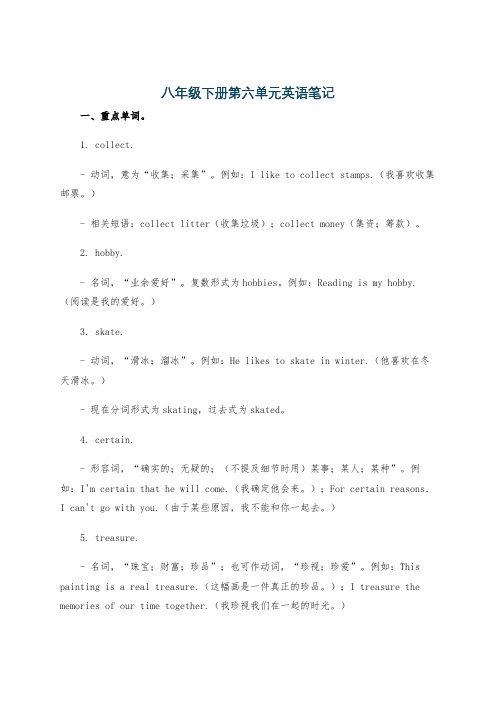
八年级下册第六单元英语笔记一、重点单词。
1. collect.- 动词,意为“收集;采集”。
例如:I like to collect stamps.(我喜欢收集邮票。
)- 相关短语:collect litter(收集垃圾);collect money(集资;筹款)。
2. hobby.- 名词,“业余爱好”。
复数形式为hobbies。
例如:Reading is my hobby.(阅读是我的爱好。
)3. skate.- 动词,“滑冰;溜冰”。
例如:He likes to skate in winter.(他喜欢在冬天滑冰。
)- 现在分词形式为skating,过去式为skated。
4. certain.- 形容词,“确实的;无疑的;(不提及细节时用)某事;某人;某种”。
例如:I'm certain that he will come.(我确定他会来。
);For certain reasons, I can't go with you.(由于某些原因,我不能和你一起去。
)5. treasure.- 名词,“珠宝;财富;珍品”;也可作动词,“珍视;珍爱”。
例如:This painting is a real treasure.(这幅画是一件真正的珍品。
);I treasure the memories of our time together.(我珍视我们在一起的时光。
)6. island.- 名词,“岛”。
例如:There is a beautiful island in the sea.(海里有一个美丽的岛。
)7. page.- 名词,“(书刊或纸张的)页;面;张”。
例如:Turn to page 10.(翻到第10页。
)8. hurry.- 动词,“匆忙;赶快”;名词,“匆忙;急忙”。
- 常用短语:hurry up(赶快;急忙(做某事));in a hurry(匆忙地;急于)。
例如:Hurry up, or we'll be late.(快点,否则我们要迟到了。
八年级下册英语1~3单元笔记

八年级下册英语1~3单元笔记Unit 1 What's the matter?一、重点单词。
1. matter.这个词可太重要啦,它主要是“事情;问题;状况”的意思。
比如说“What's the matter?”就是“怎么了?出什么事了?”这可是用来询问别人状况的常用句子哦。
就像你看到朋友一脸愁容,直接来一句“What's the matter?”超实用的。
2. sore.它表示“疼痛的;酸痛的”。
例如“I have a sore throat.”(我喉咙痛。
)可以想象一下,你吃了太多辣的东西,然后喉咙就变得sore啦,那种感觉可不好受呢。
3. stomachache.这是个合成词,“stomach”(胃)加上“ache”(疼痛),就是“胃痛;腹痛”啦。
如果吃坏肚子了,就会说“I have a stomachache.”。
4. foot feet(复数)这是个不规则的复数变化。
“My feet hurt.”(我的脚疼。
)可别写成“foots”哦,那可就闹笑话啦。
二、重点短语。
1. have a cold.这个短语就是“感冒”的意思。
比如说冬天穿得少了,就很容易“have a cold”。
感觉就像有个小病菌在你身体里捣乱,让你打喷嚏、流鼻涕。
2. lie down.它是“躺下”的意思。
当你感觉不舒服的时候,医生可能就会说“Lie down and have a rest.”(躺下休息一下。
)想象一下,你累得不行或者身体不舒服,往床上一躺,舒舒服服地休息。
3. take one's temperature.这是“量某人的体温”的意思。
要是感觉发烧了,就得拿个体温计“take your temperature”,看看是不是真的发烧了。
就像身体里有个小火炉,得看看温度有多高呢。
三、重点句型。
1. “What should I do?”这个句子是“我应该做什么?”的意思。
当遇到问题或者身体不舒服的时候,就可以这么问。
八年级下册英语语法知识点归纳总结
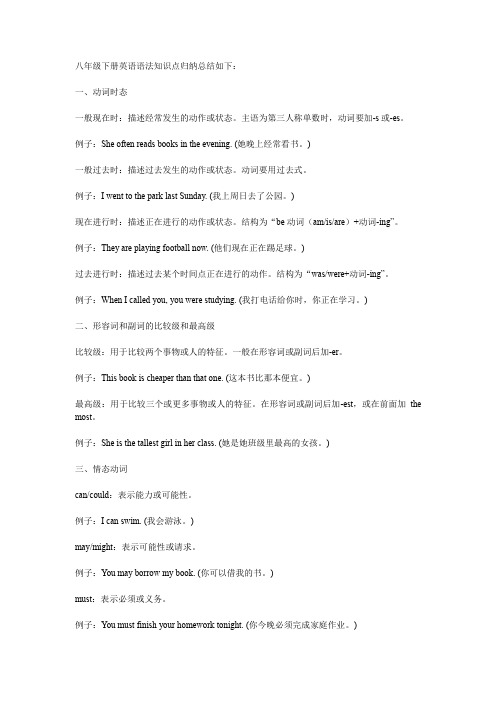
八年级下册英语语法知识点归纳总结如下:一、动词时态一般现在时:描述经常发生的动作或状态。
主语为第三人称单数时,动词要加-s或-es。
例子:She often reads books in the evening. (她晚上经常看书。
)一般过去时:描述过去发生的动作或状态。
动词要用过去式。
例子:I went to the park last Sunday. (我上周日去了公园。
)现在进行时:描述正在进行的动作或状态。
结构为“be动词(am/is/are)+动词-ing”。
例子:They are playing football now. (他们现在正在踢足球。
)过去进行时:描述过去某个时间点正在进行的动作。
结构为“was/were+动词-ing”。
例子:When I called you, you were studying. (我打电话给你时,你正在学习。
)二、形容词和副词的比较级和最高级比较级:用于比较两个事物或人的特征。
一般在形容词或副词后加-er。
例子:This book is cheaper than that one. (这本书比那本便宜。
)最高级:用于比较三个或更多事物或人的特征。
在形容词或副词后加-est,或在前面加the most。
例子:She is the tallest girl in her class. (她是她班级里最高的女孩。
)三、情态动词can/could:表示能力或可能性。
例子:I can swim. (我会游泳。
)may/might:表示可能性或请求。
例子:You may borrow my book. (你可以借我的书。
)must:表示必须或义务。
例子:You must finish your homework tonight. (你今晚必须完成家庭作业。
)四、被动语态被动语态用于描述事物的状态或描述被动发生的动作。
结构为“be动词(am/is/are/was/were)+动词的过去分词”。
八年级下册人教版英语笔记

八年级下册人教版英语笔记一、Unit 1 What's the matter?1. 重点单词。
- matter:n. 问题;事情。
常用搭配:What's the matter (with sb.)? = What's wrong (with sb.)? = What's the trouble (with sb.)?(某人)怎么了?- sore:adj. 疼痛的;酸痛的。
例如:a sore throat喉咙痛。
- stomachache:n. 胃痛;腹痛。
- foot:n. 脚;足。
复数形式是feet。
- neck:n. 脖子;颈部。
- fever:n. 发烧。
have a fever发烧。
- lie:v. (lay - lain)躺;平躺。
lie down躺下。
- rest:v. & n. 放松;休息。
take breaks/take a break = have a rest休息。
- cough:v. & n. 咳嗽。
have a cough咳嗽。
- toothache:n. 牙痛。
2. 重点短语。
- have a cold:感冒。
- have a stomachache:胃痛。
- lie down and rest:躺下休息。
- drink some hot tea with honey:喝些加蜂蜜的热茶。
- see a dentist:看牙医。
- get an X - ray:拍X光片。
- take one's temperature:量体温。
3. 重点句型。
- What should I do? 我应该做什么?- You should see a dentist and get an X - ray. 你应该去看牙医并拍X光片。
- Should I put some medicine on it? 我应该在上面敷些药吗?- Yes, you should. / No, you shouldn't. 是的,你应该。
八年级下册英语四单元笔记
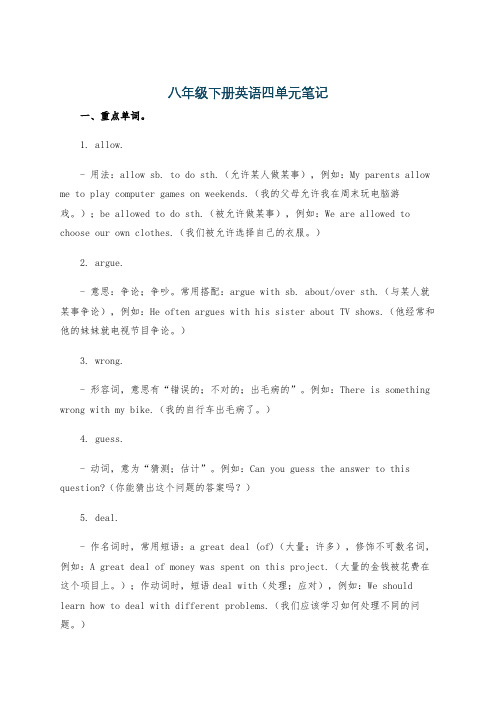
八年级下册英语四单元笔记一、重点单词。
1. allow.- 用法:allow sb. to do sth.(允许某人做某事),例如:My parents allow me to play computer games on weekends.(我的父母允许我在周末玩电脑游戏。
);be allowed to do sth.(被允许做某事),例如:We are allowed to choose our own clothes.(我们被允许选择自己的衣服。
)2. argue.- 意思:争论;争吵。
常用搭配:argue with sb. about/over sth.(与某人就某事争论),例如:He often argues with his sister about TV shows.(他经常和他的妹妹就电视节目争论。
)3. wrong.- 形容词,意思有“错误的;不对的;出毛病的”。
例如:There is something wrong with my bike.(我的自行车出毛病了。
)4. guess.- 动词,意为“猜测;估计”。
例如:Can you guess the answer to this question?(你能猜出这个问题的答案吗?)5. deal.- 作名词时,常用短语:a great deal (of)(大量;许多),修饰不可数名词,例如:A great deal of money was spent on this project.(大量的金钱被花费在这个项目上。
);作动词时,短语deal with(处理;应对),例如:We should learn how to deal with different problems.(我们应该学习如何处理不同的问题。
)6. relation.- 名词,意思是“关系;联系;交往”。
例如:The relation between the two countries is very important.(两国之间的关系非常重要。
八下英语笔记
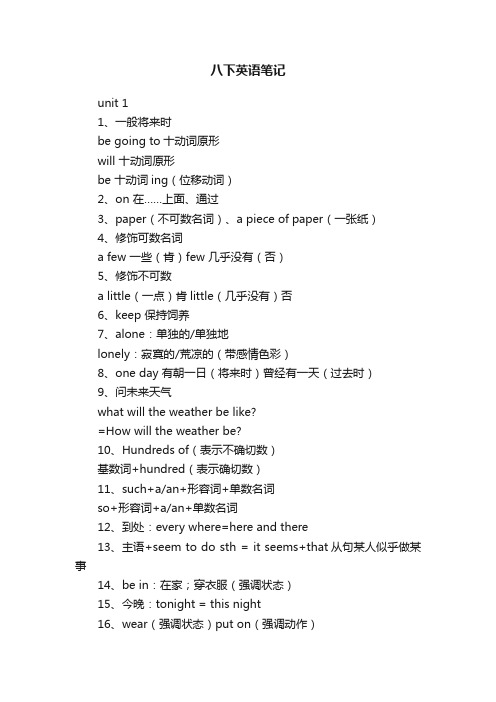
八下英语笔记unit 11、一般将来时be going to十动词原形will 十动词原形be 十动词ing(位移动词)2、on 在……上面、通过3、paper(不可数名词)、a piece of paper(一张纸)4、修饰可数名词a few 一些(肯)few 几乎没有(否)5、修饰不可数a little(一点)肯little(几乎没有)否6、keep 保持饲养7、alone:单独的/单独地lonely:寂寞的/荒凉的(带感情色彩)8、one day 有朝一日(将来时)曾经有一天(过去时)9、问未来天气what will the weather be like?=How will the weather be?10、Hundreds of(表示不确切数)基数词+hundred(表示确切数)11、such+a/an+形容词+单数名词so+形容词+a/an+单数名词12、到处:every where=here and there13、主语+seem to do sth = it seems+that从句某人似乎做某事14、be in:在家;穿衣服(强调状态)15、今晚:tonight = this night16、wear(强调状态)put on(强调动作)dress sb (给某人穿衣服)be in(强调状态)17、help sb( to) do sth(帮助某人做某事)help sb with sth(在某方面帮助某人)18、疑问词+do yor think+主+谓+其他Belive+that 从句19、…ago(…以前)用一般过去时宾语从句→用陈述句(主+谓)fly to +地点“in+一段时间”用“Hou long”提问There will be +主+其它(将会有)20、live to be + 年龄(活到…岁)it is +形+(for sb)to do sth对某人来说做某事怎么样look up (查找)fall in love with 人/物(爱上某人或某物)be able to = can(能;会)There be sb doing sth (有人正在做某事)worry about sb (担心某人)be used for (用来做什么)unit 21、某人怎么了?what`s wrong with sb?what`s the matter with sb?what`s the trorble with sb?what`s up?2、给某人打电话?Call sb up = ring sb up3、你认为某人某物怎么样?what do you think of sb/sth?=How do you like sb/sth?4、对主语来说borrow sth from sb (借进)lend sth to sb (借出)5、为某人买某物buy sth for sb = buy sb sth6、either(句末)否too (句末)肯also(在句中be动词/情/助之后,实义动词前肯)7、把某物归还某人return sb sth =return sth to sb和某人打架fight with sb = have a fight with sb8、get on 上车、相处建议advice (名)advise(动)9、各种各样all kinds of参加take part in+活动join+组织compare…with(与…比较)compare…to(把…比作)10、find sb doing sth 发现某人正在做某事advice sb to do sth 建议某人做某事see sb doing sth 看见某人正在做某事ask sb for help 寻求帮助argue with sb 与某人争论11、enough(修饰形/副词时enough 放在后)call sb at…(拨打电话…找…)特殊疑问词+动词不定式(to+动词原形)相当于名词:It`s time for +名(该是…时候)= It`s time to do sth13、sb spend 时间/钱+(in)doing sthsb spend 时间/钱+on sth(某人花费多少时间/钱做某事)sb+pay+钱for sth (某人为…付…钱)物+cost+sb+钱(某物花费某人多少钱?)It takes sb+时间to do sth(某花人费多少时间做某事)14、告诉某人(不要)做某事tell sb to do sthtell sb (not) to do sthmay be (也许)副may be(可能是)谓语unit 31、was/were+动ing (过去进行时)get out of (从…出来)be interested in(对…感兴趣)over = more than (超出)about = around(大约)2、when:两个动作可以同时发生、先后发生while:两个动作同时发生,从句常用进行时3、到达:arrive at + 小地点arrive in + 大地点get to + 地点reach + 地点4、imagine doing sth (想象做某事)imagine + that 从句5、感叹句what + a/an+单数名词+主+谓!how + 形/副+主+谓!6、shout at sb(对…大声喊)有责备之意Shout to sb (对…高声叫喊)7、in a tree(外来人或物在树上)on a tree(本身长在树上)发生:happen(偶然发生)、take place(计划中的事情)8、somewhere (某处)肯anywhere (任何地方)否定句或疑问问中everywhere (到处)肯定9、最后:finally(副)=at last =in the end10、evevy(日常的)形every day (每天)用在一般现在时unit 41、be mad at sb = be angry with sb 对某人生气不再not…anymore = no more (be动词之后,实义动词前) be supposed to=should 应该;应当be supposed to do sth 应当做某事2、take a message for sb 给某人捎口信leave a message 留口信3、be good at=do well in 擅长…+ed 的形容词→修饰人+ing的形容词→修饰物做某事遇到困难:have a hard time with sthhave a hard time doing sthwant to know = wonder 想知道4、be nervous 紧张的get nervous 变得紧张feel nervous 感到紧张luck(名)幸运lucky(形)幸运的ludeily(副)幸运地决定:decision(名词)>decide(动词)decide to do sth决定的做某事out of danger (脱离危险)in danger 危险(名词)dangerous 危险的(形容词)5、both…and(两者都)between…and (两者)之间open up one`s eyes (使某人开眼界)unit 51、let out 允许出去let in 允许进入or 用在否定/一般疑问句中and,用在肯定句中2、want sb to do sth 想要某人做某事ask sb to do sth 叫某人做某事3、why not +动词原形=why don`t you+动词原形all over the world = around the world 世界各地4、以…而闻名:be famous as +职业be famous for+原因cook 名词:厨师;动词:做饭cooker 炊具;cook sth for sb,为某人做某东西5、spend time with sb 和某人共度时光laugh at sb 嘲笑某人make +人+形容词(使某人处在…状态)had better (not) do sth 最好(不)做某事6、If+一般现在时,主句一般将来时7、make money 赚钱make a living(by)doing sth 靠做某事谋生8、be against sb/sth 反对某人/某事unit 61、现在完成进行时:have /has+been+动ing 现在完成进行时:①用for+一般时间②Since+过去时间点③Since+从句④Since+┅ago2、raise sth for sb 为某人筹集某物Several=a few基数词+and a half year=基数词+years and a half3、collect 收藏(动词)collector 收藏家(动词)collection 收藏品(名词)4、anyone=anybody作主语时,谓语动词用单数,用在否定句/疑问名/条件状语从语5、on one`s+序数词+birthday在某人的第几个生日6、finish doing sth 完成做某事7、准确数:基数+thousand不准确数:thousand+of8、How much ①对价钱提问;②对不可数名词数量提问9、be certain that从句(确信…)10、It`s+形容词+(for sb)+to +do+sth对某人来说,做某事怎么样11、“the+形容词比较级、the+形容词比较级”“越…越…”“形容词的比较级+and形容词比较级”“越来越…”12、enjoy doing sth“喜欢做某事”hear+that 从句(陈述句)14、East 东方东方的South 南方南方的+ernWest 西方西方的north 北方北方的15、far away 在远处far from 离…远16、用光run out of 主语是人run out 主语是物unit 71、Would you mind(not)doing sth? =Would you mind+if 从句你介意(不)做…吗?2、回答:不介意:①No,not at all②certainly not③of course not介意:①I`m sorry but…②I`m afraid…③Yes,You`d better not…3、right away (立刻,马上)=at once=right now →用在将来的时态中=in a minute4、Could you please (not)do sth?请你(不)做…好吗?5、工作任务work(不可数名词)job(可数名词)task (可数名词)它是一个令人困难、疲倦的工作6、complain about sth 抱怨做某事give---gave---givenbring---broughtbuy---boughtchoose---chose---chosen7、sth doesn't work=There is some thing wrong with sth某东西坏了8、形容词:annoying 使…生气的(物)annoyed 生气的(人)annoy 使…生气(动词)9、be friendly to sb 对某人友好be polite to sb 对某人有礼貌10、try to do sth 尽力做某事try not to do sth 尽力不做某事11、the way to +地点welcome to +地点(欢迎来到某地)12、否定前缀polite---impolite 礼貌Possible---impossible 可能13、小心:take care = be careful = look out take care to do sth小心做某事14、pick up:捡起;接人;搭车15、allow sb (not)to do sth允许某人(不)做某事be(not)allowed to do sth (不)被允许做某事17、keep(on) doing sth 继续做某事18、sth happens to sb 某事发生在某人身上happen to do sth 碰巧…19、即使even if =even thoughunit 81、why don't you do sth?=why not do sth?你为什么不做…2、get sb sth=get sth for sb给某人买某物3、How about…?=what about…?……怎么样4、scarf的复数,将f改为v,再加es scaves6、感叹句What+a/an+形+名词单数+主谓!What+形+名词复数/不可数名+主+谓!How+形/副+主+谓7、合成形容词基数词---单数名词---形容词例:5---year---old 5岁的8、too…to+动原形太…而不能…so…that 从句如此…以致not…enough to+动原形不够…做…9、called=named not…at all 一点也不10、be interested in…=take an interest in…对…感兴趣11、sleep(动、名)asleep(形、只作表语)sleepy (困倦的,有睡意的,但没有睡着,作定语)12、too many+可数名词的复数太多too much+不可数名词much too (太)14、rather than = instead of 而不是16、nearly=almost 几乎hardly 几乎不17、suggest(动)建议suggestion(名)可数名词不可数名词:advice18、suggest doing sth建议做某事make sb do sth让某人做某事encourage sb to do sth鼓励某人做某事20、除…之外except:(除…之外,其他都…)后面的人或物被排除在外besides(除…之外,还有…)后面的人或物包括在内make friends with sb和某人交朋友21、share sth with sb 和某人分享某物make progress 取得进步unit 91、have / has been to +地点曾经去过某地(不在原地,已回来)have / has gone to + 地点去了某地(去的路上/到了那个地方)2、neithor的用法(两者都不)1)neither+单数名词2)neithor of +人称代词/名词复数3)neither+be/助/情态动词+另一个主语(上面提到的否定情况,也适用于另一个主语)4)neither…nor…既不…也不…3、end up with=finish doing sth 以…结束4、在现在完成时中,短暂性动词不能与一段时间连用,必须转化延续性动词。
人教版八年级下册unit 3英语笔记

人教版八年级下册Unit 3的英语笔记一、重点词汇及短语1. clean* 动词:“清洁;打扫”* 形容词:“干净的”* 常见搭配:clean the room(打扫房间);clean and tidy(干净整洁的)2. rubbish* 名词:“垃圾”* 同义词:trash/garbage/litter/waste* 常见搭配:take out the rubbish(倒垃圾)3. fold* 动词:“对折,折叠”* 常见搭配:fold one’s clothes(叠衣服)4. sweep* 动词:“打扫,清扫”* 常见搭配:sweep the floor(扫地);sweep the living room(打扫客厅)5. make* 动词:“使;做;制作;整理”* 常见搭配:make one’s bed(铺床);make sb. do sth.(使某人做某事)6. finish* 动词:“完成”* 常见搭配:finish doing sth.(完成做某事)7. mess* 名词:“混乱,脏乱”* 形容词:messy(杂乱的)* 常见搭配:make a mess(弄得一团糟);(be)in a mess(乱七八糟)8. go out* 动词短语:“外出”* 常见搭配:go out for dinner(外出吃饭);go out for…(为……外出)9. stay out* 动词短语:“呆在外面”* 常见搭配:stay out late(晚归)10. ride* 动词:“骑行”* 名词:“短途旅行”* 常见搭配:ride a bike(骑自行车);ride a horse(骑马)11. work* 动词:“工作;从事”* 常见搭配:work on(从事;忙于);work for…(为……工作);work as…(作为……工作)12. help* 动词:“帮助”* 常见搭配:help out with…(帮助做……);help sb. (to)do/with sth.(帮助某人干某事)13. at least* 副词短语:“至少”14. all the time* 副词短语:“一直;总是”15. neither* 代词/副词:“二者都不;也不”* 常见搭配:neither…nor…(既不……也不……);neither + 助动词/情态动词 + 主语(“……也不”)16. in surprise* 副词短语:“惊讶地”17. throw* 动词:“扔,投掷”* 常见搭配:throw down(扔下);throw away(扔掉);throw to…(扔给……);throw at…(向……扔去)18. as soon as* 连词短语:“一……就……”19. come over* 动词短语:“过来;顺便来访”20. reply* 动词:“回复”* 常见搭配:reply to sb.(回复某人)21. hang out* 动词短语:“闲逛”22. pass* 动词:“通过;传递”* 常见搭配:pass sb. sth.(把某物传给某人)23. borrow* 动词:“借,借用”* 常见搭配:borrow sth. from sb.(从某人那里借回某物)24. lend* 动词:“借给,借出”* 常见搭配:lend sb. sth.(把某物借给某人)25. hate* 动词:“憎恶,讨厌”* 常见搭配:hate to do sth.(讨厌做某事)26. chore* 名词:“杂务,乏味的工作”* 常见搭配:do chores(做杂务)27. share* 动词:“分享;分担”* 常见搭配:share the housework(分担家务)28. invite* 动词:“邀请”* 常见搭配:invite sb. to a party(邀请某人参加聚会);invite sb. to do sth.(邀请某人做某事)29. mind* 动词:“介意”* 常见搭配:mind doing sth.(介意做某事)30. depend* 动词:“取决于,依靠,依赖”* 常见搭配:depend on(依靠于);depend on/upon+某人/某物;depend on/upon+从句二、重点句型1. Could you please do sth.?* 句型:“请你做……好吗?”* 肯定回答:Sure/Certainly/Of course/No problem./With pleasure…* 否定回答:Sorry,I can’t./I’d love to,but I…2. I have to do some work.* 句型:“我必须干些活。
八年级下册英语第四单元笔记

八年级下册英语第四单元笔记一、重点单词1、 allow (v)允许;准许常用搭配:allow sb to do sth 允许某人做某事例如:My parents don't allow me to stay up late 我的父母不允许我熬夜。
2、 wrong (adj)错误的;不对的反义词:right 正确的例如:What you did is wrong 你做的是错的。
3、 guess (v)猜测;估计例如:Can you guess the answer? 你能猜出答案吗?4、 deal (n)协议;交易常用搭配:make a deal 达成协议例如:They made a deal to solve the problem 他们达成协议来解决这个问题。
5、 relation (n)关系;联系;交往常用搭配:have a relation with 与有关系例如:The relation between them is very good 他们之间的关系很好。
6、 communication (n)交流;沟通动词形式:communicate 交流;沟通例如:Good communication is very important in a family 在一个家庭中,良好的沟通非常重要。
7、 argue (v)争吵;争论常用搭配:argue with sb about sth 因某事与某人争吵例如:They often argue with each other about money 他们经常因为钱而互相争吵。
8、 cloud (n)云;云朵形容词形式:cloudy 多云的例如:There are many clouds in the sky 天空中有很多云。
9、 elder (adj)年纪较长的辨析:elder 常用来表示兄弟姐妹之间年龄较大的;older 则更常用于表示人或物的年龄较大。
八年级下英语知识点归纳

一、词汇:1.名词:可数名词和不可数名词的用法,如单数、复数形式、所有格等。
2.代词:人称代词、物主代词、反身代词、指示代词、不定代词等的用法。
3. 动词:be动词、实义动词、情态动词的用法,以及时态、语态等的变化。
4.介词:表示时间、地点、方向、方式等的常见介词的使用。
5.数词:基数词、序数词、分数等的用法。
6.冠词:定冠词和不定冠词的用法。
7.形容词和副词:形容词和副词的比较级和最高级的变化,以及修饰位置的特殊情况。
8.前缀和后缀:常见的前缀和后缀的构词法。
二、语法:1.句子的基本结构:主谓结构、主谓宾结构、主语从句、宾语从句等。
2.时态:一般现在时、一般过去时、一般将来时、现在进行时等时态的用法。
3.被动语态:被动语态的构成和用法。
4.祈使句:祈使句的用法,以及一些常用的祈使句句型。
5.条件句:零条件句、一般条件句、虚拟条件句等条件句的用法。
6.定语从句和状语从句:定语从句和状语从句的引导词和连接词的用法。
三、阅读理解:1.判断事实和推理:阅读短文,根据所读内容判断事实的真伪,以及进行简单的推理。
2.理解细节:从短文中找出相关细节,回答问题或完成任务。
3.推断意义:通过猜测词义、上下文推断等,理解隐含在短文中的意义。
4.主旨归纳:根据短文的内容,概括出短文的主旨或中心思想。
5.信息归纳:将短文中的信息按照一定的组织方式进行归纳。
以上是八年级下英语知识点的大致归纳,涵盖了词汇、语法和阅读理解等方面。
当然,具体的知识点还需要结合具体教材和学校的教学要求来确定。
希望以上内容对您有所帮助。
(完整版)八年级英语下册笔记
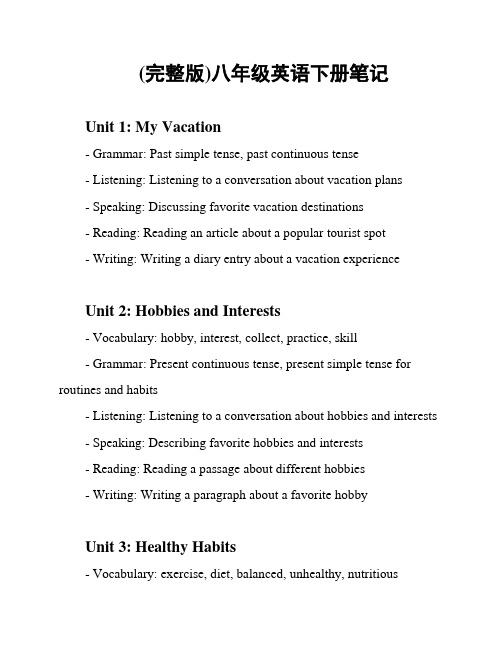
(完整版)八年级英语下册笔记Unit 1: My Vacation- Grammar: Past simple tense, past continuous tense- Listening: Listening to a conversation about vacation plans- Speaking: Discussing favorite vacation destinations- Reading: Reading an article about a popular tourist spot- Writing: Writing a diary entry about a vacation experienceUnit 2: Hobbies and Interests- Vocabulary: hobby, interest, collect, practice, skill- Grammar: Present continuous tense, present simple tense for routines and habits- Listening: Listening to a conversation about hobbies and interests - Speaking: Describing favorite hobbies and interests- Reading: Reading a passage about different hobbies- Writing: Writing a paragraph about a favorite hobbyUnit 3: Healthy Habits- Vocabulary: exercise, diet, balanced, unhealthy, nutritious- Grammar: Will for future predictions and plans- Listening: Listening to a conversation about healthy habits- Speaking: Discussing personal health habits- Reading: Reading an article about staying healthy- Writing: Writing a persuasive essay about the importance of exerciseUnit 4: Technology and Social Media- Vocabulary: device, internet, social media, privacy, cyberbullying - Listening: Listening to a conversation about technology addiction - Speaking: Discussing advantages and disadvantages of social media- Reading: Reading a passage about the impact of technology on society- Writing: Writing a blog post about the pros and cons of social mediaUnit 5: The Environment- Vocabulary: pollution, recycling, renewable, climate change, conservation- Grammar: Passive voice- Listening: Listening to a conversation about environmental issues - Speaking: Discussing ways to protect the environment- Reading: Reading an article about reducing plastic waste- Writing: Writing a letter to the local government about environmental concernsUnit 6: Jobs and Careers- Vocabulary: occupation, salary, entrepreneur, opportunity, resume - Grammar: Present perfect tense- Listening: Listening to a conversation about future career plans- Speaking: Talking about dream jobs and aspirations- Reading: Reading a passage about successful entrepreneurs- Writing: Writing a personal statement for a job applicationUnit 7: Cultural Differences- Vocabulary: tradition, custom, diversity, etiquette, stereotype- Grammar: Past perfect tense- Listening: Listening to a conversation about cultural customs- Speaking: Discussing cultural differences and similarities- Reading: Reading an article about world festivalsUnit 8: Teen Issues- Vocabulary: peer pressure, bullying, self-esteem, adolescence, addiction- Grammar: Reported speech- Listening: Listening to a conversation about teenage problems - Reading: Reading an advice column for teenagers- Writing: Writing a letter to a friend offering adviceUnit 9: Travel and Adventure- Vocabulary: explore, adventure, destination, tourist, challenge - Grammar: Conditional sentences (type 1 and type 2)- Listening: Listening to a conversation about travel experiences - Speaking: Describing an ideal adventure trip- Reading: Reading a travel blog about a thrilling hike- Writing: Writing a story about a memorable travel experience以上是八年级英语下册的笔记,每个单元涉及的词汇、语法、听力、口语、阅读和写作内容都有说明。
八年级下册英语知识点归纳总结

八年级下册英语知识点归纳总结英语作为一门语言学科,对于学生的重要性不言而喻。
对于八年级的学生来说,下册的英语课程内容更加深入和复杂。
为了帮助大家更好地掌握这些知识点,以下是八年级下册英语知识点的归纳总结。
一、语法知识点1. 时态:包括一般现在时、一般过去时、一般将来时、现在进行时、现在完成时等。
2. 语态:包括主动语态和被动语态。
3. 从句:包括名词性从句、定语从句和状语从句。
4. 倒装句:包括完全倒装和部分倒装。
5. 虚拟语气:包括与现在事实相反、与过去事实相反、对未来可能性的虚拟等。
6. 比较级和最高级:包括形容词和副词的比较级和最高级。
二、听力技巧1. 倾听和理解对话:通过训练来提高听力的准确度和速度。
2. 捕捉重要信息:识别对话或短文中的关键词,以便回答问题。
3. 多听多练:通过听英语广播、音乐、电影等提高对语言的理解和感觉。
三、阅读理解技巧1. 阅读前的准备:先浏览全文,了解主题和结构,预测可能出现的问题。
2. 注意关键词:通过找出关键词来理解和归纳文章的主要观点。
3. 上下文推测:通过上下文的提示推测生词或难句的含义。
4. 主旨概括:找出文章的主旨,简洁明了地进行概括。
四、写作技巧1. 书写格式:了解各类英语写作的格式要求,如书信、报道、日记等。
2. 语言表达:通过积累词汇和短语,提高写作时的语言表达能力。
3. 句子结构:学会使用各种句子结构多样化地表达思想。
4. 逻辑连贯:正确使用连接词和过渡词,使文章逻辑清晰,段落衔接自然。
五、口语表达技巧1. 准确发音:通过模仿和练习,纠正发音错误,提高口语表达的准确度。
2. 流利对话:通过多与他人进行英语对话,提高口语交流的流利度。
3. 日常用语:积累日常用语,提高在不同情境下的语言应用能力。
以上是八年级下册英语知识点的归纳总结,希望对大家的学习有所帮助。
通过掌握这些知识点和技巧,相信你们能够在英语学习中取得更好的成绩。
加油!。
八下英语笔记
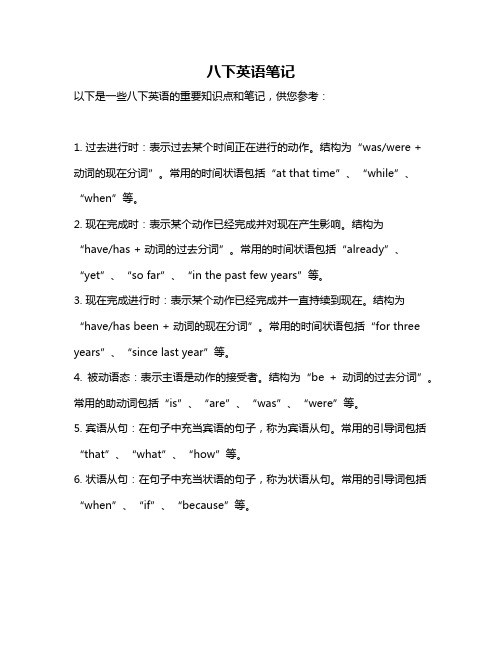
八下英语笔记以下是一些八下英语的重要知识点和笔记,供您参考:1. 过去进行时:表示过去某个时间正在进行的动作。
结构为“was/were + 动词的现在分词”。
常用的时间状语包括“at that time”、“while”、“when”等。
2. 现在完成时:表示某个动作已经完成并对现在产生影响。
结构为“have/has + 动词的过去分词”。
常用的时间状语包括“already”、“yet”、“so far”、“in the past few years”等。
3. 现在完成进行时:表示某个动作已经完成并一直持续到现在。
结构为“have/has been + 动词的现在分词”。
常用的时间状语包括“for three years”、“since last year”等。
4. 被动语态:表示主语是动作的接受者。
结构为“be + 动词的过去分词”。
常用的助动词包括“is”、“are”、“was”、“were”等。
5. 宾语从句:在句子中充当宾语的句子,称为宾语从句。
常用的引导词包括“that”、“what”、“how”等。
6. 状语从句:在句子中充当状语的句子,称为状语从句。
常用的引导词包括“when”、“if”、“because”等。
7. 虚拟语气:表示与实际情况相反的情况或不可能实现的愿望。
结构为“would/could/might + 动词的过去分词”。
常用的时间状语包括“if only”、“in my dreams”等。
8. 情态动词:表示推测或意愿的动词,常用的情态动词包括“can”、“may”、“must”、“should”等。
9. 不定代词:表示不确定的人、事物或数量的代词,常用的不定代词包括“some”、“any”、“no”、“every”、“all”等。
10. 介词:表示名词、代词与动词之间的关系,常用的介词包括“at”、“in”、“on”、“with”、“by”等。
初二下册英语知识点归纳

初二下册英语知识点归纳1. 时态:- 一般现在时:表示经常性的动作、习惯、真理等。
- 现在进行时:表示正在进行的动作。
- 一般过去时:表示过去的某个时间发生的动作或存在的状态。
- 过去进行时:表示过去某个时间正在进行的动作。
- 将来时:表示将要发生的动作。
2. 名词:- 可数名词:可以单独表示一个或多个的名词。
- 不可数名词:不能用于复数形式的名词,只能作为整体来看待。
- 所有格:表示所属关系的名词形式,一般在名词后面加's。
3. 形容词:- 基本形容词:用于修饰名词。
- 比较级形容词:用于表示两者之间的比较。
- 最高级形容词:用于表示三者或三者以上的比较。
4. 副词:- 修饰动词、形容词或其他副词,用于表示程度、方式、时间等。
5. 代词:- 主格代词:作主语的代词形式。
- 宾格代词:作动词或介词的宾语的代词形式。
- 形容词性物主代词:表示所属关系的代词形式。
- 名词性物主代词:作为名词的代替。
6. 数词:- 基数词:表示数量的词。
- 序数词:表示顺序的词。
7. 冠词:- 定冠词:表示特指的冠词形式,即“the”。
- 不定冠词:表示泛指的冠词形式,即“a/an”。
8. 动词:- 及物动词:需要带宾语才能完成意义的动词。
- 不及物动词:不需要带宾语就能完成意义的动词。
- 动词不定式:由“to”加动词原形构成的短语。
9. 介词:- 用于连接名词、代词或动词与其他词语的词。
10. 连词:- 表示并列关系的连词,如“and, but, or”等。
- 表示选择关系的连词,如“either…or, neither…nor”等。
- 表示因果关系的连词,如“because, so, therefore”等。
11. 疑问句:- 一般疑问句:以助动词、情态动词或be动词开头的陈述句,问句式为“助动词/情态动词/be动词+主语+谓语?”- 特殊疑问句:用特殊疑问词引导的疑问句,如“what, when, where, who, which, why, how”等。
八年级下册英语知识点

八年级下册英语知识点第一篇:八年级下册英语知识点初二(下)英语知识点总结I.重点短语1.on time 2.out of 3.all by oneself 4.lots of 5.no longer 6.get back 7.sooner or later 8.run away 9.eat up 10.take care of 11.turn off 12.turn on13.after a while 14.make faces15.teach oneself 16.fall off 17.play the piano 18.knock at 19.to one's surprise 20.look up 21.enjoy oneself 22.help yourself 23.tell a story / stories 24.leave....behind …… e along 26.hold a sports meeting 27.be neck and neck 28.as...as 29.not so / as...as 30.do one's best 31.take part in 32.a moment late 33.Bad luck!34.fall behind 35.high jump 36.long jump 37.relay race 38.well done!39.take off 40.as usual 41.a pair of 42.at once43.hurry offe to oneself 45.after a while 46.knock on 47.take care of 48.at the moment 49.set off50.here and there 51.on watch 52.look out53.take one’s placeII.重要句型1.We’d better not do sth.2.leave one.oneself3.find one’s way to a place4.stand on one’s head5.make sb.Happy6.catch up with sb.7.pass on sth.to somebody8.spend time doing sth.9.go on doing sth.10.get on well with sb.11.be angry with sb.12.be fed up with sth.13.not…until…14.make room for sb.III.交际用语1.We’re all by ourselves.2.I fell a little afraid.3.Don’t be afraid.4.Help!5.Can’t you hear anything?6.I can’t hear anything / anybody there.7.Maybe it’s a tiger.8.Let’s get it bac kbefore they eat the food.9.Did she learn all by herself? 10.Could she swim when she was …years old? 11.She didn’t hurt herself.12.He couldn’t buy himself many nice things.13.Did he enjoy himself? 14.Help yourselves.15.Bad luck!e on!17.Well done!Con gratulations(to…)!18.It must be very interesting.19.I don’t think you’ll like it.20.It seems to be an interesting book.21.I’m sure(that)… I’m not sure if… I’m not sure what to… 22.I hope so.23.What was he/she drawing when…?24.I’m sorry to trouble you.25.Would you please…? 26.What were you doing at ten o’clock yesterday morning? 27.You look tired today.28.You’d better go to bed early tonight, if you can.29.How kind!30.Let’s move the bag, or it may cause an accident.31.It’s really nice of you.32.Don’t mentio n it.33.Don’t crowd around him.IV.重要语法1.不定代词/副词的运用;2.反身代词的用法;3.并列句;4.形容词和副词的比较等级;5.冠词的用法;6.动词的过去进行时;【名师讲解】 1.bring/takeBring表示“带来、拿来”,指从别处朝说话人所在或将在的地方“带来、拿来”。
八年级下册英语笔记重点归纳

八年级下册英语笔记重点归纳一、Unit 1 What's the matter?1. 重点单词。
- matter n.问题;事情。
常用搭配:What's the matter (with sb.)?(某人)怎么了?- have a cold 感冒。
类似的表达还有:have a fever(发烧),have a cough (咳嗽)等。
- stomachache n.胃痛;腹痛。
“-ache”为后缀,表示疼痛,如:headache (头痛),toothache(牙痛)。
- foot n.脚,复数形式为feet。
- lie v.躺;平躺。
lie - lay - lain。
例如:You should lie down and rest.(你应该躺下休息。
)- rest v. n.放松;休息。
如:take a rest(休息一下)。
2. 重点短语。
- take one's temperature 量体温。
例如:The nurse took my temperature.(护士给我量了体温。
)- take breaks (take a break) 休息。
We should take breaks when we are tired.(当我们累的时候应该休息。
)- get off 下车。
He got off the bus at the next stop.(他在下一站下了公共汽车。
)- to one's surprise 使……惊讶的是;出乎……的意料。
To my surprise, he passed the exam.(令我惊讶的是,他通过了考试。
)- What should I do? 我应该做什么?用于询问建议。
- You should see a dentist and get an X - ray. 你应该去看牙医并且拍个X 光片。
should为情态动词,后接动词原形,表示建议。
八年级下册英语知识点笔记
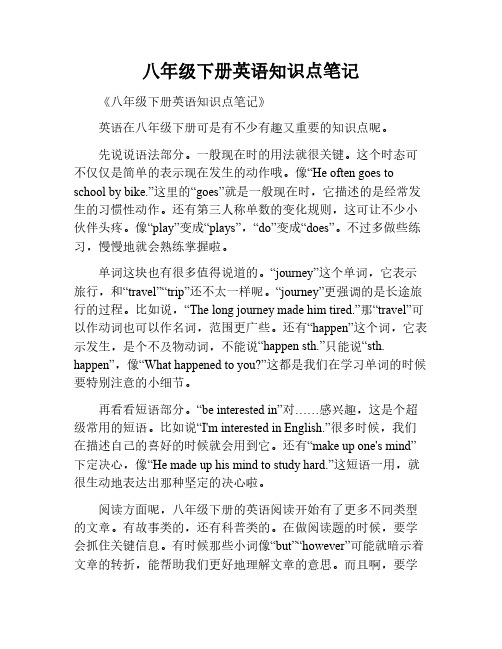
八年级下册英语知识点笔记《八年级下册英语知识点笔记》英语在八年级下册可是有不少有趣又重要的知识点呢。
先说说语法部分。
一般现在时的用法就很关键。
这个时态可不仅仅是简单的表示现在发生的动作哦。
像“He often goes to school by bike.”这里的“goes”就是一般现在时,它描述的是经常发生的习惯性动作。
还有第三人称单数的变化规则,这可让不少小伙伴头疼。
像“play”变成“plays”,“do”变成“does”。
不过多做些练习,慢慢地就会熟练掌握啦。
单词这块也有很多值得说道的。
“journey”这个单词,它表示旅行,和“travel”“trip”还不太一样呢。
“journey”更强调的是长途旅行的过程。
比如说,“The long journey made him tired.”那“travel”可以作动词也可以作名词,范围更广些。
还有“happen”这个词,它表示发生,是个不及物动词,不能说“happen sth.”只能说“sth. happen”,像“What happened to you?”这都是我们在学习单词的时候要特别注意的小细节。
再看看短语部分。
“be interested in”对……感兴趣,这是个超级常用的短语。
比如说“I'm interested in English.”很多时候,我们在描述自己的喜好的时候就会用到它。
还有“make up one's mind”下定决心,像“He made up his mind to study hard.”这短语一用,就很生动地表达出那种坚定的决心啦。
阅读方面呢,八年级下册的英语阅读开始有了更多不同类型的文章。
有故事类的,还有科普类的。
在做阅读题的时候,要学会抓住关键信息。
有时候那些小词像“but”“however”可能就暗示着文章的转折,能帮助我们更好地理解文章的意思。
而且啊,要学会根据上下文去猜单词的意思,不能一碰到不认识的单词就慌了神。
人教版八年级英语下册全册知识点考点整理

八年级英语下册全册各单元知识点考点整理Unit 1 what's the matter?一、重点短语1.too much太多2.lie down躺下3.get an X-ray做个X光检查4.take one’s temperature量体温5.put some medicine on......在....上敷药6.have a fever发烧7.take breaks/take a break休息8.without thinking twice没多想9.get off下车10.take sb to the hospital送某人去医院11.wait for等待12.to one’s surprise使.......惊讶的13.thanks to多亏于;由于14.in time及时15.think about考虑16.have a heart problem患有心脏病17.get into the trouble遇到麻烦18.do the right thing做正确的事情事情19.fall down摔倒20.put......on sth把...放在某物上21.get hit/sunburned摔伤/烧伤22.be interested in对.....感兴趣23.be used to习惯于....24.take risks/take a risk挑战25.lose one’s life失去生命26.because of因为27.run out of用完28.cut off切除29.get out of从...出来30.make a decision/decisions做决定31.be in control of掌管;管理32.give up放弃主要句型1.It’s+形容词+for sb.+to do sth.做某事对某人来说是…的。
It’s important to do sth.做某事很重要。
八年级下册英语六单元笔记
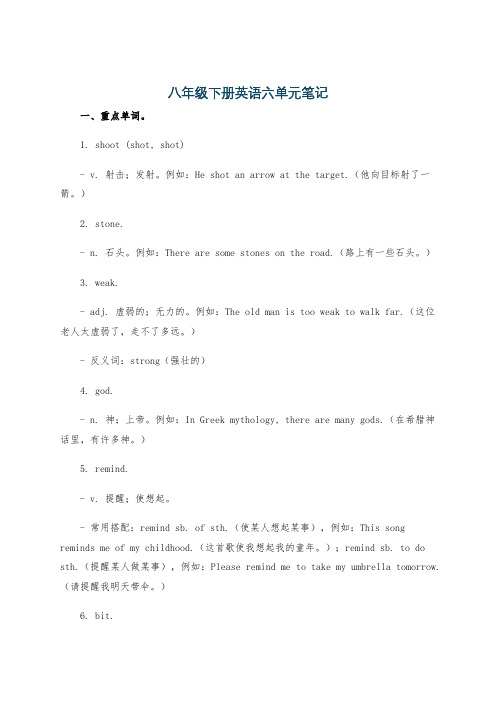
八年级下册英语六单元笔记一、重点单词。
1. shoot (shot, shot)- v. 射击;发射。
例如:He shot an arrow at the target.(他向目标射了一箭。
)2. stone.- n. 石头。
例如:There are some stones on the road.(路上有一些石头。
)3. weak.- adj. 虚弱的;无力的。
例如:The old man is too weak to walk far.(这位老人太虚弱了,走不了多远。
)- 反义词:strong(强壮的)4. god.- n. 神;上帝。
例如:In Greek mythology, there are many gods.(在希腊神话里,有许多神。
)5. remind.- v. 提醒;使想起。
- 常用搭配:remind sb. of sth.(使某人想起某事),例如:This song reminds me of my childhood.(这首歌使我想起我的童年。
);remind sb. to do sth.(提醒某人做某事),例如:Please remind me to take my umbrella tomorrow.(请提醒我明天带伞。
)6. bit.- n. 一点;小块。
- 常用短语:a little bit(有点儿),例如:The box is a little bit heavy.(这个盒子有点儿重。
)7. silly.- adj. 愚蠢的;不明事理的。
例如:It was silly of you to make such a mistake.(你犯这样的错误真愚蠢。
)- 近义词:stupid, foolish。
8. object.- n. 物体;物品。
例如:I can't see the small object clearly.(我看不清这个小物体。
)- v. 反对。
八年级英语下册知识点笔记
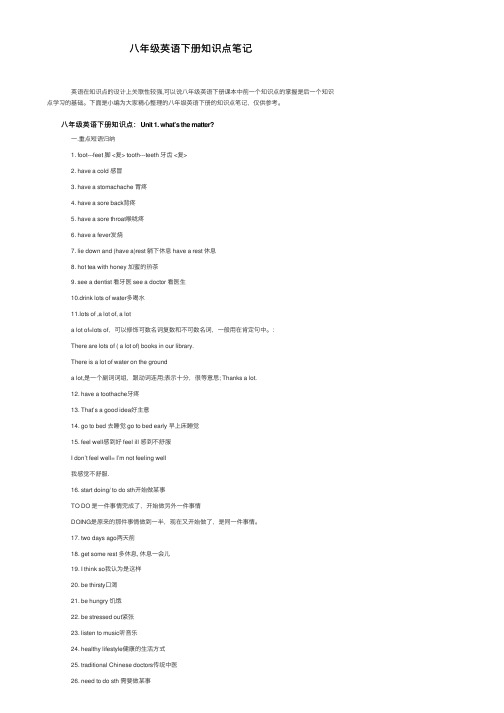
⼋年级英语下册知识点笔记 英语在知识点的设计上关联性较强,可以说⼋年级英语下册课本中前⼀个知识点的掌握是后⼀个知识点学习的基础。
下⾯是⼩编为⼤家精⼼整理的⼋年级英语下册的知识点笔记,仅供参考。
⼋年级英语下册知识点:Unit 1. what’s the matter? ⼀.重点短语归纳 1. foot---feet 脚 <复> tooth---teeth ⽛齿 <复> 2. have a cold 感冒 3. have a stomachache 胃疼 4. have a sore back背疼 5. have a sore throat喉咙疼 6. have a fever发烧 7. lie down and (have a)rest 躺下休息 have a rest 休息 8. hot tea with honey 加蜜的热茶 9. see a dentist 看⽛医 see a doctor 看医⽣ 10.drink lots of water多喝⽔ 11.lots of ,a lot of, a lot a lot of=lots of,可以修饰可数名词复数和不可数名词,⼀般⽤在肯定句中。
: There are lots of ( a lot of) books in our library. There is a lot of water on the ground a lot,是⼀个副词词组,跟动词连⽤;表⽰⼗分,很等意思; Thanks a lot. 12. have a toothache⽛疼 13. That’s a good idea好主意 14. go to bed 去睡觉 go to bed early 早上床睡觉 15. feel well感到好 feel ill 感到不舒服 I don’t feel well= I’m not feeling well 我感觉不舒服. 16. start doing/ to do sth开始做某事 TO DO 是⼀件事情完成了,开始做另外⼀件事情 DOING是原来的那件事情做到⼀半,现在⼜开始做了,是同⼀件事情。
人教版八年级下册英语笔记

人教版八年级下册英语笔记一、重点词汇。
1. garbage(读音:英 [ˈɡɑːbɪdʒ] 美 [ˈɡɑːrbɪdʒ] )- 解释:垃圾;废物。
- 造句:Please take out the garbage before it starts to smell.(请在垃圾发臭之前把它倒掉。
)- 近义词:trash ,rubbish。
2. fold(读音:英 [fəʊld] 美 [foʊld] )- 解释:折叠;对折。
- 造句:Can you help me fold these clothes?(你能帮我叠这些衣服吗?)- 近义词:bend。
3. sweep(读音:英 [swiːp] 美 [swiːp] )- 解释:打扫;清扫。
- 造句:I need to sweep the floor before my mom comes home.(我得在妈妈回家前扫扫地。
)- 近义词:clean。
二、重点短语。
1. take out the trash.- 解释:倒垃圾。
- 例句:It's your turn to take out the trash.(轮到你倒垃圾了。
)2. do the dishes.- 解释:洗餐具。
- 例句:After dinner, I usually do the dishes.(晚饭后,我通常洗餐具。
)3. fold the clothes.- 解释:叠衣服。
- 例句:She asked me to fold the clothes and put them away.(她让我把衣服叠好收起来。
)三、重点句型。
1. Could you please + 动词原形?- 解释:这是一个表示请求的常用句型,用于礼貌地请求别人做某事。
回答通常用Sure. / Of course. / No problem. 等表示同意,用Sorry, I can't. I have to... 等表示拒绝。
- 1、下载文档前请自行甄别文档内容的完整性,平台不提供额外的编辑、内容补充、找答案等附加服务。
- 2、"仅部分预览"的文档,不可在线预览部分如存在完整性等问题,可反馈申请退款(可完整预览的文档不适用该条件!)。
- 3、如文档侵犯您的权益,请联系客服反馈,我们会尽快为您处理(人工客服工作时间:9:00-18:30)。
3. have a stomachache 胃疼
4. have a sore back背疼
5. have a sore throat喉咙疼
6. have a fever发烧
7. lie down and (have a)rest 躺下休息 have a rest 休息
做早操对你们的建康有益。
2.be good at 擅长于......
Li Ping is good at basketball. 李平擅长于篮球。
= Li Ping is good at playing basketball. 李平擅长于打篮球。
be good at = do well in 如:
2.That’s too bad. You should / shouldn’t … 那太糟糕了. 你应该/不该…
You should lie down and rest / drink hot tea with honey / see a dentist / see a doctor .
32.angry 用法 be angry with sb生某人的气
I was angry with him for keeping me waiting. 我对他很生气,因为他让我等了好久。
be angry at/ about sth 就某事生气
33.Chinese medicine 中药
He shouldn’t eat anything = He should eat nothing. 他不应当吃任何东西.
3.I’m not felling well . 这里well表示身体状况,不能用good代替
I don’t feel well= I’m not feeling well 我感觉不舒服.
8. hot tea ห้องสมุดไป่ตู้ith honey 加蜜的热茶
9. see a dentist 看牙医 see a doctor 看医生
10.drink lots of water多喝水
11.lots of ,a lot of, a lot
a lot of=lots of,可以修饰可数名词复数和不可数名词,一般用在肯定句中。:
I'm good at math. = I do well in math. 我擅长于数学。
3.be good to 对......好
Parents are always good to their children.父母亲总是对他们的孩子好。
31.get good grades 取得好成绩
be bad for sth./ doing sth. 对什么有害
be good to 对…好
be good at =do well in 在……方面好,擅长
be good(bad) for、be good at的相关用法
1.be good for 对......有益
Doing morning exercises is good for your health.
16. start doing/ to do sth开始做某事
TO DO 是一件事情完成了,开始做另外一件事情
DOING是原来的那件事情做到一半,现在又开始做了,是同一件事情。
17. two days ago两天前
18. get some rest 多休息, 休息一会儿
19. I think so我认为是这样
20. be thirsty口渴
21. be hungry 饥饿
22. be stressed out紧张
23. listen to music听音乐
24. healthy lifestyle健康的生活方式
25. traditional Chinese doctors传统中医
48.give sb some advice给某人建议give advice 提出建议
advice 是不可数名词
a piece of advice 一则建议 take one’s advice 采纳或听从某人的建议
He gave me some good advice.
他向我提了一些很好的意见。
28. for example例如
29. too much yin太多的阴, 阴气太盛
too much + 不可数名词 太多的…
much too +形/副 实在太… 极其,非常
too many + 可数名词复数 太多的…
30.be good for sth./ doing sth. 对什么有益 ,对什么有好处
37.balanced diet平衡饮食
38.get tired 感到疲倦 be/get tired
39.go out at night在晚上出去
When you are tired, you shouldn’t go out at night. 疲倦时,晚上你不该外出
40.stay healthy 保持健康 =keep healthy=keep in good health
做某事对某人来说是…的。
It’s important to do sth .做某事很重要。
It’s important for me to eat a balanced diet. 平衡饮食对我来说是很重要的.
It’s easy to do sth做某事是容易的。
It’s easy for us to find out the answer. 找出答案对我们来说是容易的
49.sleep 8 hours a night每晚睡眠八小时
50.take medicine 吃药 服药
I have to take medicine three times a day for my cold.因为感冒,我不得不一天吃三次药。
二 固定结构
It’s +形 + for sb. + to do sth.
There are lots of ( a lot of) books in our library.
There is a lot of water on the ground
a lot,是一个副词词组,跟动词连用;表示十分,很等意思; Thanks a lot.
12. have a toothache牙疼
26. need to do sth 需要做某事
I have a toothache. I need to see a dentist. 我牙痛, 我需要去看牙医.
We need to keep our classroom clean. 我们需要保持教室的干净.
27. a balance of yin and yang阴阳平衡
13. That’s a good idea好主意
14. go to bed 去睡觉 go to bed early 早上床睡觉
15. feel well感到好 feel ill 感到不舒服
I don’t feel well= I’m not feeling well
我感觉不舒服.
→ It’s easy to do sth . 做某事容易 / It’s important to do sth . 做某事重要
11.You should rest for a few nights. 你应该休息几个晚上
12.I study late every night, sometimes until 2 am, but I don’t think I’m improving.
41.at the moment此时,此刻= now
I’m not feeling very well at the moment
42.enjoy sth. =like sth. (名词)喜欢某物,
enjoy doing sth.喜欢做某事=like dong sth
enjoy oneself (myself, yourself,herself, himself, themselves, ourselves, itself
这里 to be healthy是动词不定式短语,作目的状语
7.You should eat hot yang foods, like beef. 你应该吃一些像牛肉之类的阳性食物。
8.Eating Dangshen and Huangqi herbs is also good for this.
34.be popular in + some place 在某地很流行
Chinese medicine is now popular in many western countries. 现在中药在许多西方国家受欢迎。
35.in western countries在西方国家
36.It’s easy to do sth做某事是容易的。 It’s important to do sth . 做某事很重要。
英语在知识点的设计上关联性较强,可以说八年级英语下册课本中前一个知识点的掌握是后一个知识点学习的基础。下面是小编为大家精心整理的八年级英语下册的知识点笔记,仅供参考。
八年级英语下册知识点:Unit 1. what’s the matter?
一.重点短语归纳
1. foot---feet 脚 <复> tooth---teeth 牙齿 <复>
4.When did it start ? About two days ago . 什么时候开始的?大约两天前
